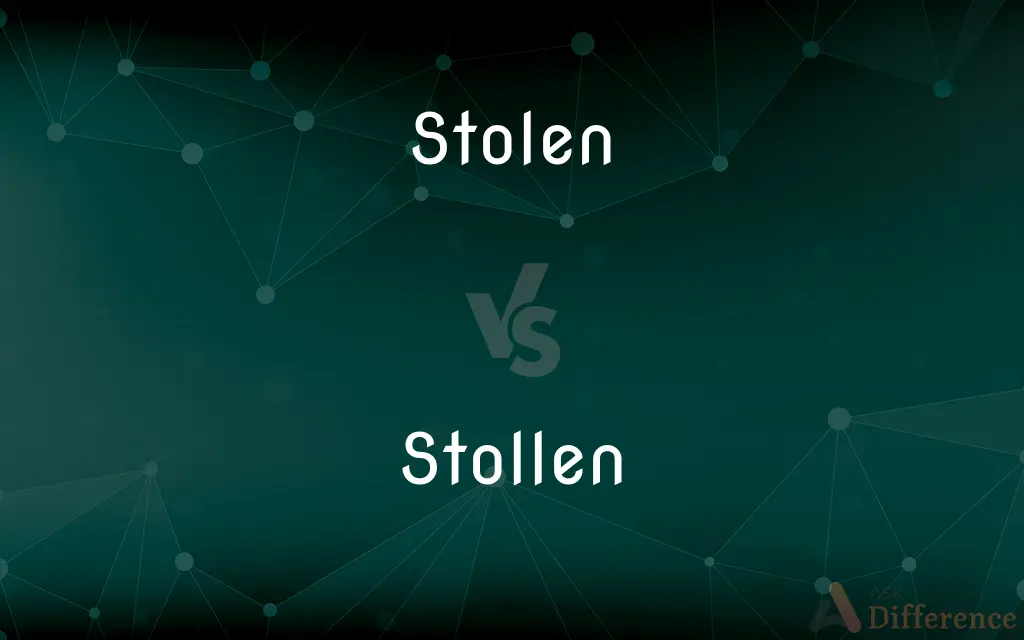Stolen vs. Stollen — What's the Difference?
By Tayyaba Rehman & Fiza Rafique — Updated on April 7, 2024
Stolen refers to something taken without permission, while Stollen is a traditional German fruit bread.

Difference Between Stolen and Stollen
Table of Contents
ADVERTISEMENT
Key Differences
Stolen, in its basic form, describes the act of taking someone else's property without permission, indicating theft or burglary. It's a term widely used in legal and everyday contexts to denote an action where property is unlawfully taken from its rightful owner. On the other hand, Stollen is a specific type of bread, originating from Germany, known for its rich ingredients, including dried fruits, nuts, spices, and often marzipan, coated with powdered sugar, enjoyed especially during the Christmas season.
The term "stolen" is used across various contexts to describe an item or items that have been unlawfully taken from someone. It implies a violation of property rights and is subject to legal consequences. In contrast, Stollen is celebrated for its festive association and cultural significance, particularly in German-speaking countries, where it is a traditional holiday treat, highlighting the contrast between an illegal act and a cherished culinary tradition.
While stolen items may involve anything from personal belongings to intellectual property, impacting individuals and communities, Stollen represents a cherished tradition, bringing people together during holiday celebrations. This distinction underscores the vastly different nature of the two terms—one related to crime and the other to cultural heritage and celebration.
The repercussions of having something stolen can be significant, affecting one’s sense of security and well-being, and may involve legal action to recover the stolen property or seek justice. Meanwhile, making or sharing Stollen during the holiday season is an act of joy and festivity, emphasizing the warmth of communal gatherings and the spirit of giving, further illustrating the contrast in their implications.
Despite their phonetic similarity, the two terms could not be more different in meaning and connotation. "Stolen" carries a negative implication, associated with loss and violation, while "Stollen" is associated with joy, tradition, and the culinary arts, demonstrating the importance of context in understanding and interpreting language.
ADVERTISEMENT
Comparison Chart
Definition
Taken without permission
German fruit bread
Context
Legal, everyday
Culinary, festive
Implications
Negative, involving loss
Positive, associated with joy
Consequences/Uses
Legal action, loss of property
Holiday celebrations, tradition
Cultural Association
None
German holiday tradition
Compare with Definitions
Stolen
Violation of rights.
Stolen identity cases are rising, impacting credit scores.
Stollen
Culinary delight.
Stollen is a must-have during German Christmas markets.
Stolen
Legal context.
The stolen artwork was recovered by the police.
Stollen
Festive tradition.
Baking Stollen is a family tradition in many German households.
Stolen
Universal applicability.
Stolen goods are sold on the black market.
Stollen
Holiday gift.
Giving Stollen as a gift symbolizes warmth and festivity.
Stolen
Property loss.
He reported his stolen car to the insurance company.
Stollen
Cultural heritage.
Stollen has a history dating back several centuries in Germany.
Stolen
Emotional impact.
Victims of stolen heirlooms often feel a personal loss.
Stollen
Rich ingredients.
The dough for Stollen is enriched with dried fruits and nuts.
Stolen
Past participle of steal.
Stollen
Stollen (German pronunciation: [ˈʃtɔlən] (listen) or [ʃtɔln] (listen)) is a fruit bread of nuts, spices, and dried or candied fruit, coated with powdered sugar or icing sugar and often containing marzipan. It is a traditional German bread eaten during the Christmas season, when it is called Weihnachtsstollen (after "Weihnachten", the German word for Christmas) or Christstollen (after Christ).
Stolen
Past participle of steal
Stollen
A rich yeast bread containing dried fruit, such as raisins, candied fruit, such as citron, chopped nuts, and spices.
Stolen
That has been stolen.
Stollen
A traditional German cake eaten at Christmas time, made with nuts, raisins and other dried fruits.
Stolen
Something which has been stolen.
Stolen
Taken dishonestly;
The purloined letter
Common Curiosities
Can Stollen be found outside of the Christmas season?
While traditionally a Christmas treat, some bakeries may offer Stollen year-round due to its popularity.
What are typical consequences for having something stolen?
Legal action and efforts to recover the item, alongside potential emotional distress.
What is the main difference between stolen and Stollen?
Stolen refers to taking something without permission, while Stollen is a traditional German bread.
What legal protections exist against theft?
Laws vary by jurisdiction but typically include penalties for theft and mechanisms for victims to seek restitution.
Why is Stollen associated with Christmas?
Its rich, hearty ingredients and traditional preparation make it a festive staple during the winter season.
How can one distinguish Stollen from other breads?
By its distinctive loaf shape, dusting of powdered sugar, and the presence of dried fruits and marzipan.
What makes Stollen unique among holiday treats?
Its rich mixture of dried fruits, nuts, spices, and often marzipan, distinguishes it from other holiday breads.
How do stolen items impact individuals?
Beyond the loss of property, stolen items can lead to emotional and financial strain.
Is it common for stolen items to be recovered?
Recovery rates vary widely depending on the item and circumstances of the theft.
What are some variations of Stollen?
Variations can include different types of nuts, fruits, and the inclusion or exclusion of marzipan.
Share Your Discovery

Previous Comparison
Adhan vs. Azan
Next Comparison
Drizzle vs. MizzleAuthor Spotlight
Written by
Tayyaba RehmanTayyaba Rehman is a distinguished writer, currently serving as a primary contributor to askdifference.com. As a researcher in semantics and etymology, Tayyaba's passion for the complexity of languages and their distinctions has found a perfect home on the platform. Tayyaba delves into the intricacies of language, distinguishing between commonly confused words and phrases, thereby providing clarity for readers worldwide.
Co-written by
Fiza RafiqueFiza Rafique is a skilled content writer at AskDifference.com, where she meticulously refines and enhances written pieces. Drawing from her vast editorial expertise, Fiza ensures clarity, accuracy, and precision in every article. Passionate about language, she continually seeks to elevate the quality of content for readers worldwide.














































